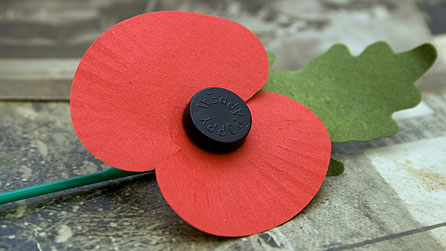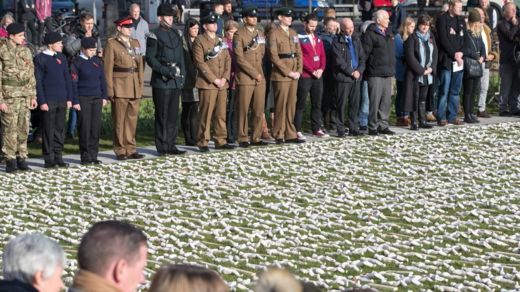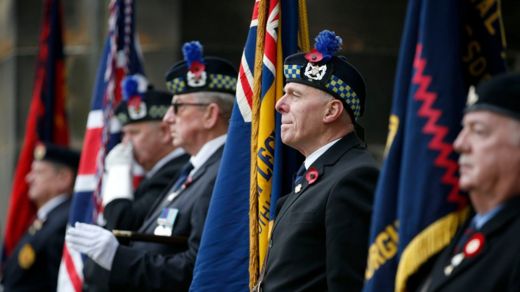It's 11.08am, which means that Britain has just observed two minutes' silence on Armistice Day...
Armistice Day 2016: Two minutes' silence marks day of national remembrance
BBC News
11 November 2016

A two-minute silence has been observed across the UK to remember the nation's war dead for Armistice Day.
Prince Harry will lay a wreath at the National Memorial Arboretum in Staffordshire for the commemorations.
Silence fell at 11:00 GMT to remember servicemen and women killed in battle.
England and Scotland footballers are expected to risk breaking Fifa rules forbidding "political statements" when they wear poppy armbands at their 2018 World Cup qualifying match at Wembley later.
People gathered at war memorials and in schools, offices and other public places across the UK as they paused for two minutes to commemorate the moment the guns fell silent for peace at the end of World War One on 11 November 1918.
Prince Harry will read Rupert Brooke's poem The Soldier, written at the beginning of the war, as part of the service at the National Memorial Arboretum.

Ahead of Friday's events, Prince Harry greets a child at Westminster Abbey in London

Prince Harry will read Rupert Brooke's poem The Soldier, written at the beginning of World War I, as part of the service at the National Memorial Arboretum in Alrewas, Staffordshire

England and Scotland are expected to risk breaking Fifa rules forbidding "political statements" when they wear poppy armbands when they play each other in their 2018 World Cup qualifying match at Wembley tonight
He will later join a military parade with several hundred veterans and serving members of the armed forces at the Arboretum, which since 2001 has been a national site of remembrance.
The Prince of Wales will attend a service in Bahrain, where he will lay a wreath and meet senior military representatives and UK veterans working in the Middle East.
The Royal British Legion charity has organised dozens of events for Friday following weeks of fundraising by selling poppies.
Armistice Day is followed by Remembrance Sunday on 13 November, when royals and senior politicians pay their respects at the Cenotaph memorial in London.
Meanwhile, the Football Associations of England and Scotland have said they will let players wear black armbands with poppy emblems despite a warning from Fifa, football's governing body, that doing so could breach rules banning "political, religious or commercial" messages.
However, Fifa has since issued a statement saying it has not banned England and Scotland players from wearing armbands featuring the poppy as has been reported, because it cannot pre-judge what symbols would constitute such a breach.
Both FAs have said they are willing to face any punishment - though they insist it will not come to that.

People are at war memorials across the country for Armistice Day
In events to mark Armistice Day across the UK:
A Field of Remembrance has been planted in the grounds of Westminster Abbey, with separate fields across the country including in Staffordshire, Cardiff, Royal Wootton Bassett, Belfast and Gateshead. The fields feature a combined total of 120,000 tributes of a poppy and personal message to someone who lost their life in service
A service at Edinburgh's Scott Monument will see veterans and politicians lay wreaths, and Edinburgh Castle's gun was fired at 11:00 GMT
Bristol College Green will host 19,240 hand-knitted shrouds to mark each soldier who died on the first day of the Battle of the Somme
The Western Front Association holds an annual service at the Cenotaph in Whitehall in London where veterans and serving personnel will lay wreaths
Armistice Day

Soldiers and civilians celebrate Armistice Day on 11 November 1918
Armistice Day falls each year on 11 November to mark the day in 1918 when the fighting in World War One was stopped.
The Allies and Germany signed an armistice in a railway carriage in the Forest of Compiegne in France at 05:00. Six hours later, at 11:00, the conflict ceased.
King George V announced that a two-minute silence would be observed in 1919, four days before the first anniversary of Armistice Day. The silence continues to be observed every year on the 11th hour of the 11th day of the 11th month.
Armistice Day 2016: Two minutes' silence marks day of national remembrance - BBC News
Armistice Day 2016: Two minutes' silence marks day of national remembrance
BBC News
11 November 2016

A two-minute silence has been observed across the UK to remember the nation's war dead for Armistice Day.
Prince Harry will lay a wreath at the National Memorial Arboretum in Staffordshire for the commemorations.
Silence fell at 11:00 GMT to remember servicemen and women killed in battle.
England and Scotland footballers are expected to risk breaking Fifa rules forbidding "political statements" when they wear poppy armbands at their 2018 World Cup qualifying match at Wembley later.
People gathered at war memorials and in schools, offices and other public places across the UK as they paused for two minutes to commemorate the moment the guns fell silent for peace at the end of World War One on 11 November 1918.
Prince Harry will read Rupert Brooke's poem The Soldier, written at the beginning of the war, as part of the service at the National Memorial Arboretum.

Ahead of Friday's events, Prince Harry greets a child at Westminster Abbey in London

Prince Harry will read Rupert Brooke's poem The Soldier, written at the beginning of World War I, as part of the service at the National Memorial Arboretum in Alrewas, Staffordshire

England and Scotland are expected to risk breaking Fifa rules forbidding "political statements" when they wear poppy armbands when they play each other in their 2018 World Cup qualifying match at Wembley tonight
He will later join a military parade with several hundred veterans and serving members of the armed forces at the Arboretum, which since 2001 has been a national site of remembrance.
The Prince of Wales will attend a service in Bahrain, where he will lay a wreath and meet senior military representatives and UK veterans working in the Middle East.
The Royal British Legion charity has organised dozens of events for Friday following weeks of fundraising by selling poppies.
Armistice Day is followed by Remembrance Sunday on 13 November, when royals and senior politicians pay their respects at the Cenotaph memorial in London.
Meanwhile, the Football Associations of England and Scotland have said they will let players wear black armbands with poppy emblems despite a warning from Fifa, football's governing body, that doing so could breach rules banning "political, religious or commercial" messages.
However, Fifa has since issued a statement saying it has not banned England and Scotland players from wearing armbands featuring the poppy as has been reported, because it cannot pre-judge what symbols would constitute such a breach.
Both FAs have said they are willing to face any punishment - though they insist it will not come to that.

People are at war memorials across the country for Armistice Day
In events to mark Armistice Day across the UK:
A Field of Remembrance has been planted in the grounds of Westminster Abbey, with separate fields across the country including in Staffordshire, Cardiff, Royal Wootton Bassett, Belfast and Gateshead. The fields feature a combined total of 120,000 tributes of a poppy and personal message to someone who lost their life in service
A service at Edinburgh's Scott Monument will see veterans and politicians lay wreaths, and Edinburgh Castle's gun was fired at 11:00 GMT
Bristol College Green will host 19,240 hand-knitted shrouds to mark each soldier who died on the first day of the Battle of the Somme
The Western Front Association holds an annual service at the Cenotaph in Whitehall in London where veterans and serving personnel will lay wreaths
Armistice Day

Soldiers and civilians celebrate Armistice Day on 11 November 1918
Armistice Day falls each year on 11 November to mark the day in 1918 when the fighting in World War One was stopped.
The Allies and Germany signed an armistice in a railway carriage in the Forest of Compiegne in France at 05:00. Six hours later, at 11:00, the conflict ceased.
King George V announced that a two-minute silence would be observed in 1919, four days before the first anniversary of Armistice Day. The silence continues to be observed every year on the 11th hour of the 11th day of the 11th month.
Armistice Day 2016: Two minutes' silence marks day of national remembrance - BBC News
Last edited:






